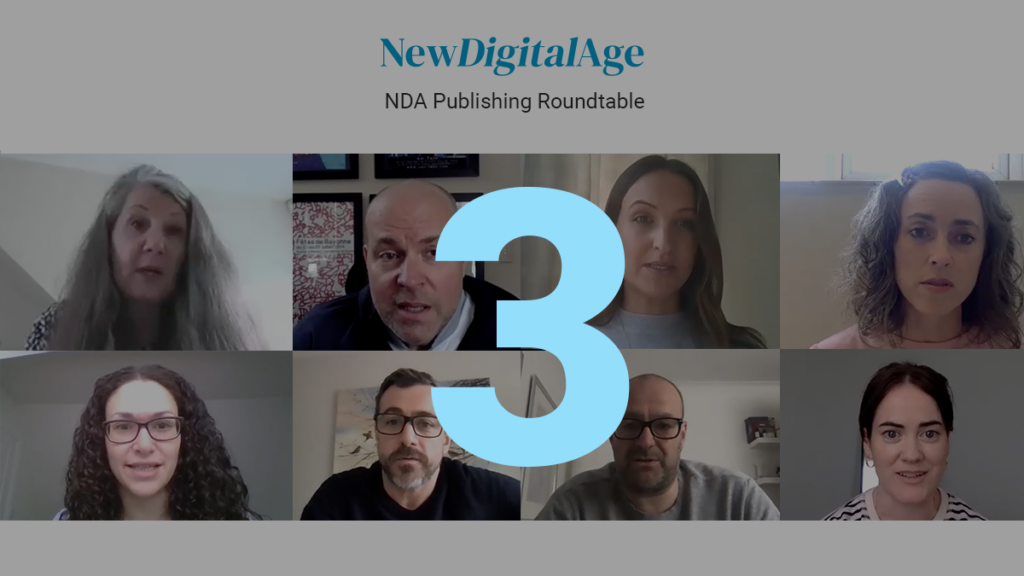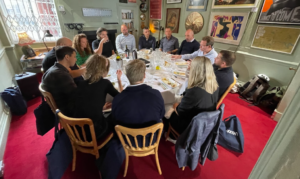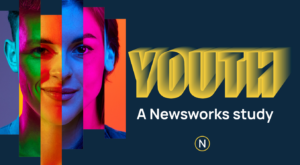“There’s a lot to get excited about because I really think this is a new era for publishers,” says Tanya Field, Co-founder and CPO of Novatiq.
She is one of eight experts talking about the future of the publishing industry at a roundtable hosted by New Digital Age and chaired by its editor Justin Pearse.
This was the view at a roundtable, hosted by New Digital Age Editor Justin Pearse, featuring: Alex Kirby, Global Head of Programmatic and Commercial Data, Dennis; Jemima Villaneuva, Executive Director, EMEA, The Atlantic; Charlotte Taylor, Head of Publishing & Audio Spark Foundry; Jane Brady, Head of Brand Partnerships, Mumsnet; Tim Cronin, VP Sales, AAX; Steve Filler, UK Country Manager, ShowHeroes Group; Tanya Field, Co-founder and CPO, Novatiq; and Dom Perkins, Digital Advertising Strategy Director, Immediate Media.
Field continues: “I don’t think the excitement lies in any one space but I think collaboration – which doesn’t have to be ‘holding hands’ together – will be at the heart of it all, and there will be a lot to gain from this at many different levels.
“However, the overriding fact is that content is the all-important thing. Emerging formats such as video and audio are becoming more and more prominent and premium publishers are going to be best-placed to deliver quality in these areas.”
She also believes that the new ID infrastructures that are being introduced and deployed to counter the demise of tracking cookies will give publishers “additional strength”.
She is not alone. Tim Cronin, VP Sales, AAX, believes that ID will be one of the big issues of the year, because of the rise of privacy as a concern – that it will be both a challenge and opportunity for publishers to solve. “I think the big question mark is going to be how much is the consumer going to be involved in terms of controlling the level of privacy,” he says.
He also questions how publishers can effectively monetise those rising levels of video viewership.
Steve Filler, UK Country Manager, ShowHeroes Group, is already invested in fast video growth, with his company specialising in helping publishers in this space. He says that the key thing for publishers to think about is how to measure the value of these emerging formats and communicate that effectively to advertisers.
“This is not just about price point,” he says. “Although we see time and again that highly engaged audiences consuming video in relevant contextual environments can deliver as cost effective an outcome as YouTube’s cost per completed view metrics.
“It doesn’t have to be that the publishers are more expensive, but more importantly, it’s about measuring the effectiveness and the value that user and publisher has.”
Emerging publisher formats are also close to Charlotte Taylor’s heart. As Head of Publishing & Audio, Spark Foundry, her role straddles publishing and audio. “I think it’s absolutely brilliant how publishers are moving into this audio space, which would have been unheard of five years ago.”
She cites “brilliant” podcasts from the Guardian, as well as News Group’s ownership of radio stations including TalkSport and its recently launched Times Radio. “Publishing is starting to play in a different field and it can now capture a slice of a different [media] pie and budgets coming from elsewhere. It’s an opportunity for them to scale further.
“Yet the key thing for me is for publishing to finally get a seat at the table with the big players.”
Audio is only one of the new growth areas for Dennis, according to Alex Kirby, Global Head of Programmatic and Commercial Data.
“Revenue diversification puts us in a healthier space. But for me, one of the biggest opportunities is going back to basics, informed by data. That means user experience, of course, and continuing the post GDPR refocus.
“Now that we’re looking at our users individually, it’s about getting the little things right – why show someone a subscription widget if we know they’re already a subscriber? We can start to personalise the ad and content environment depending on who’s viewing.”
Internally, too, data should fuel a conversation about its users and how to develop products and services that are of use and interest to them. “When you give people what they want you get amazing results back,” he adds.
Jane Brady, Head of Brand Partnerships, Mumsnet, also believes that 2021 will be a year of integration and getting better at the basics. “We can take a bit of a breath and know that all the work we’ve done around our first party audiences has meant that we’re actually in a really robust place. We know a lot about our users and how we categorise them is different to other places, which makes [our proposition] hugely valuable.”
Another focus will be on embedding newly developed formats across the site and working with clients on building long-term relationships.
Jemima Villaneuva, Executive Director, EMEA, The Atlantic, agrees with Brady. This year, she says, will be an opportunity to look at “true integration” of technology. “Last year was often about ‘quick, quick, get it out and make it work from now’ – because it has to be.
But we haven’t even begun to scratch the surface of what you can do with technology and events. For example, I’m really excited to look at sort of the use of virtual reality or augmented reality in our events.”
For Dom Perkins, Digital Advertising Strategy Director, Immediate Media, it’s more of the same. The publisher has seen great results with podcasts for BBC History and will look at rolling out the format across different verticals.
“Everyone is looking at trying different products and to understand where we’re going and what could happen. We want to understand more about our customers and we want to ensure that everything we do is privacy first – whilst also making sure that we’re commercially viable.
“Would we have been here without the pandemic? Perhaps in a couple of years, but right here, now, we’re in an exciting space.”
He concludes: “We are very lucky in this industry that we are working in a market that is changing and innovating so rapidly.”











